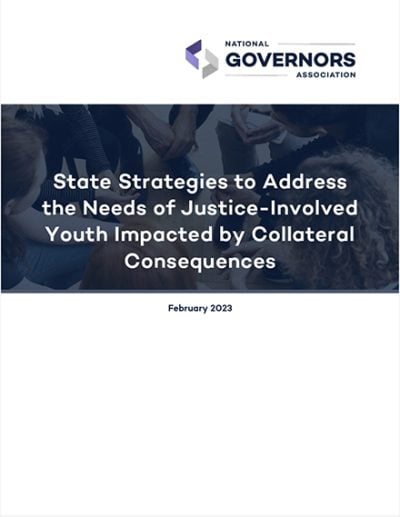Summary
Youth involved in the juvenile justice system routinely face a variety of repercussions beyond detention. Although some of these may be related directly to the violation that occurred, there are many other secondary effects that can result from their system involvement. A recent report from the National Governors Association explores the many adverse effects on youth with justice system involvement. Funded by the Annie E. Casey Foundation, the report offers state leaders policy options for mitigating these effects, which can hinder young people’s ability to make successful transitions to adulthood.
Understanding Collateral Consequences
Based on discussions with national, state and local youth justice experts, State Strategies to Address the Needs of Justice-Involved Youth Impacted by Collateral Consequences, describes the immediate and long-term harm of any involvement with the juvenile justice system, including arrest, detention, adjudication, residential placement and probation. Consequences for youth include loss of education, benefits and driver’s licenses as well as long-term effects of trauma and stigma attached to system involvement. Families of these youth may also face collateral consequences, including financial penalties, restricted housing availability and criminal charges if the state holds the parent or guardian responsible for the youth’s conduct.
Policy Solutions and Considerations for Governors and State Agencies
The report discusses two categories of strategies for reducing the secondary consequences of justice-system involvement: comprehensive youth justice reform and targeted policies.
In addition to these strategies, the report provides considerations for governors and state agencies to support reform, including:
- strengthening interagency partnerships and collaboration;
- introducing legislation to address collateral consequences;
- partnering with local nonprofit service providers;
- creating a task force, working group or oversight committee; and
- supporting community-based, trauma-informed methods for engaging youth.







